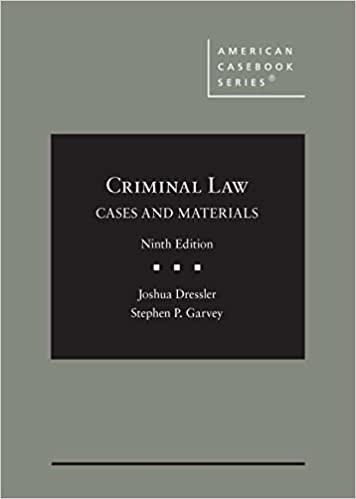Question
Question to answer: do you think Kevin's three defences should lead to him being acquitted or convicted? Why? Read the scenario to answer the question,
Question to answer: do you think Kevin's three defences should lead to him being acquitted or convicted? Why?
Read the scenario to answer the question, to evaluate Kevin's defences, use Canadian law's approach to consent, its definition of sexual assault, possible defences, and/or the relationship of these factors to major cases studied; also use reading mentioned at the bottom.
Scenario: When attending a costume party at a local bar, the accused (Kevin) groped the complainant multiple times. Despite the fact that the complainant said a clear "No" to every sexual advance Kevin made, he eventually rubbed his erect penis against her on the dance floor. The complainant reported the sexual assault to police that night, with others on record having witnessed the exchange. In defense of his actions, Kevin asserted the following points:
- The complainant was wearing a sexually revealing costume, and she did not leave at any point, meaning that there was "implied consent" for him to proceed.
- Kevin's girlfriend was attending the same costume party and wearing the same costume as the complainant. The costumes had a mask portion which mostly obscured the wearer's identity, so he believed the complainant was his girlfriend.
- Kevin's girlfriend had told him earlier that night that she might "play hard to get," but wanted him to pursue her. Kevin stated that she had therefore consented "in advance" to anything he would do.
Refer to articles- (at least three should be mentioned)
- Elizabeth Comack, "Theoretical Approaches in the Sociology of Law" inLocating Law: Race, Class, Gender, Sexuality Connections, 2nd ed (Halifax: Fernwood Publishing, 2006), pp. 18-24.
- Martha Chamallas, "Backlash: Proliferation of Critics of Feminist Legal Theory" inIntroduction to Feminist Legal Theory, 3rd ed (New York: Wolters Kluwer Law & Business, 2013), pp. 139-165.
- Diana Majury, "Women's (In)Equality before and after the Charter" in Radha Jhappan, ed,Women's Legal Strategies in Canada, 2nd ed (Toronto: University of Toronto Press, 2002), pp. 101-134.
- Brenda Cossman, "#MeToo, Sex Wars 2.0 and the Power of Law" (2019) 3Asian Yearbook of Human Rights and Humanitarian Law, pp. 1-16.
- Elaine Craig, "Sexual Assault and the Legal Profession" inPutting Trials on Trial : Sexual Assault and the Failure of the Legal Profession (Montreal: McGill-Queen's University Press, 2018), pp. 3-23.
- Ummni Khan, "Take My Breath Away: Competing Contexts Between Domestic Violence, Kink and The Criminal Justice System inR. v. J.A." (2016) 6:6Oati Socio-legal Series, pp. 1405-1425.
- Dorothy Shaw & Wendy V. Norman, "When there are no abortion laws: A case study of Canada" (2020) 62Best Practice & Research Clinical Obstetrics and Gynaecology, pp. 49-62.
- Rickie Solinger, "Conditions of Reproductive Justice" in Margaret Hobbs & Carla Rice, eds,Gender and Women's Studies: Critical Terrain, 2nd ed, (Toronto: Women's Press, 2018), pp. 527-528.
- Emmett Macfarlane, "The Overturning ofRoe v. Wade: Are Abortion Rights in Canada Vulnerable?" (2022)Canadian Journal of Political Science, pp. 1-6.
- Candace Johnson, "Drafting injustice: overturningRoe v. Wade, spillover effects and reproductive rights in context" (2022)Feminist Theory, pp. 1-6.
Step by Step Solution
There are 3 Steps involved in it
Step: 1

Get Instant Access to Expert-Tailored Solutions
See step-by-step solutions with expert insights and AI powered tools for academic success
Step: 2

Step: 3

Ace Your Homework with AI
Get the answers you need in no time with our AI-driven, step-by-step assistance
Get Started


